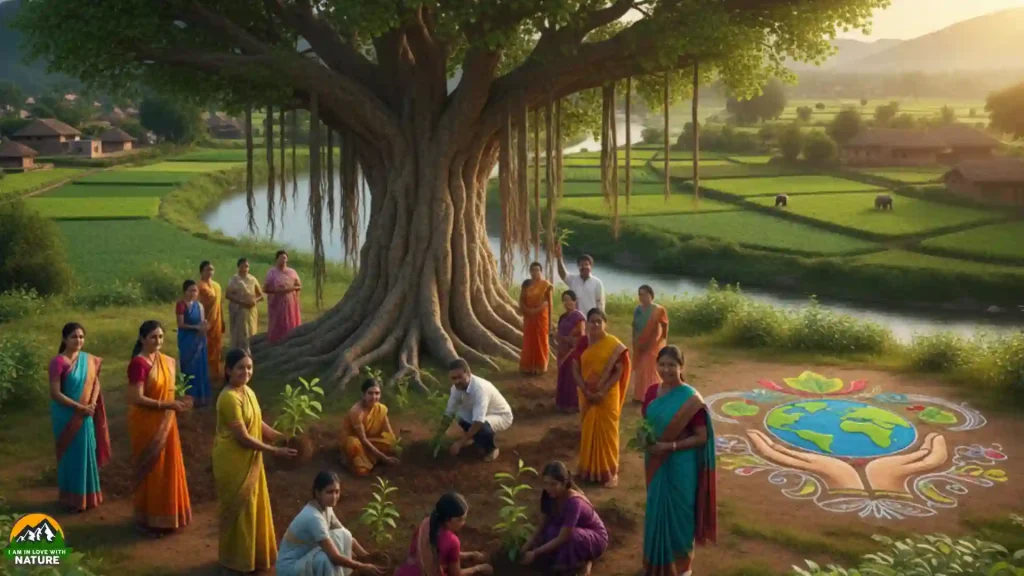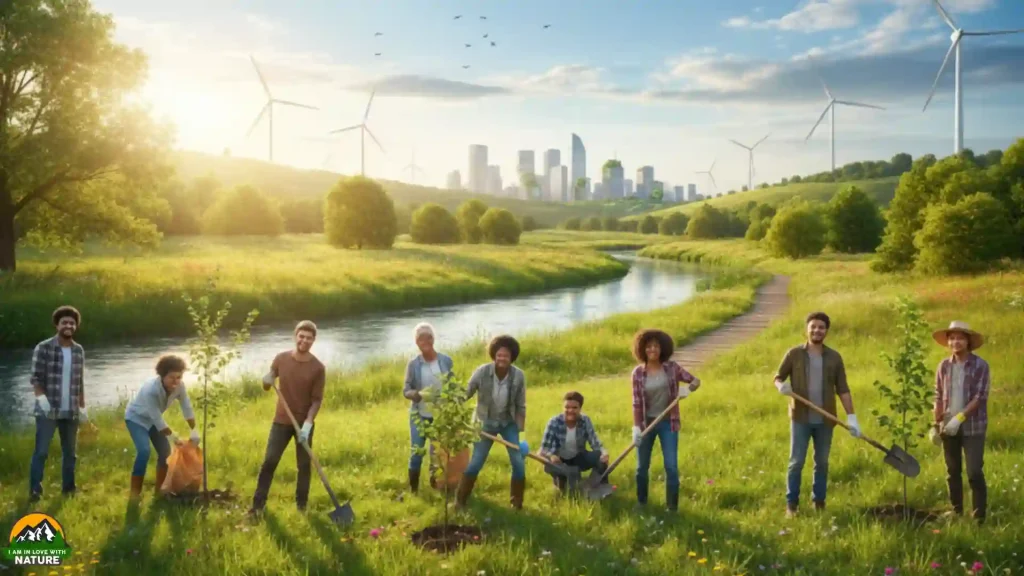Imagine sipping your morning coffee from a disposable cup, grabbing a plastic-wrapped snack on the go, or tossing out single-use bags after a quick shopping trip. These everyday conveniences add up to a massive global crisis: over 400 million tons of plastic produced annually, with much of it ending up in oceans, landfills, and even our food chain. World Environment Day serves as a powerful wake-up call to rethink our habits and drive real change. In 2025, this annual event rallied millions worldwide under the banner of “Beat Plastic Pollution,” inspiring actions big and small to protect our planet.
What Is World Environment Day?

World Environment Day, celebrated every June 5, is the United Nations’ flagship event for raising awareness about pressing environmental issues. Organized by the United Nations Environment Programme (UNEP), it encourages governments, businesses, communities, and individuals to take steps toward sustainability. Since its inception, the day has grown into a global platform, engaging over 150 countries each year with events, campaigns, and initiatives that highlight the urgency of environmental protection.
This isn’t just another calendar marker—it’s a catalyst for action. From tree-planting drives to policy pledges, World Environment Day mobilizes people to address threats like climate change, biodiversity loss, and pollution. In 2025, the focus sharpened on one of the most visible and damaging problems: plastic waste, which threatens wildlife, human health, and ecosystems everywhere.
A Brief History of World Environment Day
The roots of World Environment Day trace back to the 1972 United Nations Conference on the Human Environment in Stockholm, Sweden, where global leaders first gathered to discuss planetary challenges. The UN General Assembly established the day in 1973, with the inaugural celebration held in 1974 under the theme “Only One Earth.” Over the decades, themes have evolved to tackle emerging crises, from ozone depletion in the 1980s to biodiversity in the 2000s.

Each year, a different country hosts the main celebrations, bringing local flavors to global issues. Past hosts have included India (2018, “Beat Plastic Pollution”—a theme that echoed into 2025), Colombia (2020, biodiversity), and Saudi Arabia (2024, land restoration). This rotating spotlight ensures diverse perspectives and fosters international collaboration.
The 2025 Theme: Beat Plastic Pollution
For 2025, the theme “Beat Plastic Pollution” underscored the need to curb the plastic crisis head-on. With plastics persisting in the environment for centuries, the campaign called for refusing single-use items, promoting recycling, and innovating alternatives. The slogan emphasized collective action: reduce, reuse, recycle, and refuse. Key messages highlighted scientific evidence on plastic’s impacts, from microplastics in our bloodstreams to choked marine life.
This theme built on growing momentum, including efforts toward a global plastic treaty. It urged everyone—from policymakers to everyday consumers—to rethink plastic dependency and support sustainable solutions.
Host Country: Republic of Korea’s Role
The Republic of Korea stepped up as the 2025 host, showcasing its leadership in green innovation. Known for advanced recycling systems and eco-friendly technologies, Korea hosted flagship events in Seoul and Jeju, including forums on sustainable development and side events like “Bridging Gaps, Empowering Change.” These gatherings drew experts to discuss bridging policy gaps and empowering communities against pollution.
Korea’s involvement amplified the message, with local actions like beach cleanups and educational workshops inspiring global participants. The host’s emphasis on nature-inspired solutions demonstrated how nations can lead by example in the fight against plastic.
Key Events and Highlights from World Environment Day 2025
2025’s celebrations were a whirlwind of activity, proving that local efforts can spark global change. From schools hosting recycling challenges to cities pledging plastic bans, the day saw unprecedented engagement. In Geneva, multilateral efforts focused on a global plastic treaty, highlighting collaborative diplomacy.
Notable highlights included:
- Film Screenings and Forums: Events like CineONU tied into World Oceans Day, screening films on ocean pollution to educate audiences.
- Community Cleanups: Millions joined beach and river cleanups, removing tons of waste and raising awareness.
- Policy Pledges: Governments announced new regulations, such as extended producer responsibility laws, to hold companies accountable for plastic waste.
- Innovative Showcases: Exhibitions featured biodegradable alternatives and upcycling projects, turning trash into treasure.
Post-event outcomes showed tangible progress: increased public commitments to plastic-free living and boosted support for international agreements.
U.S. Initiatives and Participation in 2025

Across the United States, World Environment Day 2025 ignited a wave of grassroots and official actions. At the United Nations Headquarters in New York, a commemoration event spotlighted “Beat Plastic Pollution,” drawing leaders to discuss U.S. contributions to global efforts. The Environmental Protection Agency (EPA) promoted nationwide campaigns, encouraging states to adopt stricter recycling mandates.
Key U.S. initiatives included:
- Local Events: In Delaware, the River and Bay Authority hosted community gatherings emphasizing local impacts on waterways.
- Corporate Commitments: Companies like those in the waste management sector shared ways to celebrate, from office plastic audits to employee volunteer days.
- Educational Drives: Schools and nonprofits organized workshops on sustainable living, teaching kids about the plastic lifecycle.
- Policy Advances: States like California and New York advanced bills to phase out single-use plastics, aligning with federal goals.
These efforts not only reduced waste but also built community resilience against environmental threats.
The Devastating Impact of Plastic Pollution
Why the urgency? Plastic pollution isn’t just an eyesore—it’s a threat to life as we know it. Each year, 11 million metric tons of plastic enter oceans, equivalent to a truckload every minute. This harms marine species, with over 800 types affected by ingestion or entanglement. On land, microplastics contaminate soil and air, entering our bodies through food and water, potentially linked to health issues like inflammation and hormonal disruption.
Economically, it costs billions in cleanup and lost tourism. Culturally, it erodes storytelling and gender equity in affected communities, as seen in campaigns blending environmental action with social justice. Beating it requires systemic change, from production redesign to consumer shifts.
How You Can Get Involved and Make a Difference
Ready to join the movement? Here are actionable steps to beat plastic pollution in your daily life:
- Refuse Single-Use Plastics: Opt for reusable bags, bottles, and straws—small swaps with big impacts.
- Recycle Smart: Learn local guidelines to ensure materials are properly sorted and processed.
- Support Policies: Advocate for bans on unnecessary plastics by contacting representatives or signing petitions.
- Participate in Cleanups: Join or organize local events through apps like Clean Swell.
- Choose Eco-Friendly Products: Buy from brands committed to sustainable packaging.
- Educate Others: Share facts on social media or host community talks to spread awareness.
- Innovate at Home: Upcycle old plastics into crafts or garden tools.
By starting small, you contribute to a ripple effect that can transform the world.
Environment Day Celebration Host Cities
World Environment Day celebrations have been (and will be) hosted in the following cities:
| Year | Theme | Host City |
| 1973 | Only One Earth | Geneva, Switzerland |
| 1974 | Only One Earth | Spokane, United States |
| 1975 | Human Settlements | Dhaka, Bangladesh |
| 1976 | Water: Vital Resource for Life | Ontario, Canada |
| 1977 | Ozone Layer Environmental Concern; Lands Loss and Soil Degradation | Sylhet, Bangladesh |
| 1978 | Development Without Destruction | Sylhet, Bangladesh |
| 1979 | Only One Future for Our Children – Development Without Destruction | Sylhet, Bangladesh |
| 1980 | A New Challenge for the New Decade: Development Without Destruction | Sylhet, Bangladesh |
| 1981 | Ground Water; Toxic Chemicals in Human Food Chains | Sylhet, Bangladesh |
| 1982 | Ten Years After Stockholm (Renewal of Environmental Concerns) | Dhaka, Bangladesh |
| 1983 | Managing and Disposing Hazardous Waste: Acid Rain and Energy | Sylhet, Bangladesh |
| 1984 | Desertification | Rajshahi, Bangladesh |
| 1985 | Youth: Population and the Environment | Islamabad, Pakistan |
| 1986 | A Tree for Peace | Ontario, Canada |
| 1987 | Environment and Shelter: More Than A Roof | Nairobi, Kenya |
| 1988 | When People Put the Environment First, Development Will Last | Bangkok, Thailand |
| 1989 | Global Warming; Global Warning | Brussels, Belgium |
| 1990 | Children and the Environment | Mexico City, Mexico |
| 1991 | Climate Change: Need for Global Partnership | Stockholm, Sweden |
| 1992 | Only One Earth, Care and Share | Rio de Janeiro, Brazil |
| 1993 | Poverty and the Environment – Breaking the Vicious Circle | Beijing, China |
| 1994 | One Earth One Family | London, United Kingdom |
| 1995 | We the Peoples: United for the Global Environment | Pretoria, South Africa |
| 1996 | Our Earth, Our Habitat, Our Home | Istanbul, Turkey |
| 1997 | For Life on Earth | Seoul, Republic of Korea |
| 1998 | For Life on Earth – Save Our Seas | Moscow, Russia |
| 1999 | Our Earth – Our Future – Just Save It! | Tokyo, Japan |
| 2000 | The Environment Millennium – Time to Act | Adelaide, Australia |
| 2001 | Connect with the World Wide Web of Life | Torino, Italy and Havana, Cuba |
| 2002 | Give Earth a Chance | Shenzhen, China |
| 2003 | Water – Two Billion People are Dying for It! | Beirut, Lebanon |
| 2004 | Wanted! Seas and Oceans – Dead or Alive? | Barcelona, Spain |
| 2005 | Green Cities – Plan for the Planet! | San Francisco, United States |
| 2006 | Deserts and Desertification – Don’t Desert Drylands! | Algiers, Algeria |
| 2007 | Melting Ice – a Hot Topic? | London, United Kingdom |
| 2008 | Kick The Habit – Towards A Low Carbon Economy | Wellington, New Zealand |
| 2009 | Your Planet Needs You – Unite to Combat Climate Change | Mexico City, Mexico |
| 2010 | Many Species. One Planet. One Future | Rangpur, Bangladesh |
| 2011 | Forests: Nature at your Service | New Delhi, India |
| 2012 | Green Economy: Does it include you? | Brasilia, Brazil |
| 2013 | Think.Eat.Save. Reduce Your Foodprint | Ulaanbaatar, Mongolia |
| 2014 | Raise your voice, not the sea level | Bridgetown, Barbados |
| 2015 | Seven Billion Dreams. One Planet. Consume with Care. | Rome, Italy |
| 2016 | Zero Tolerance for the Illegal Wildlife trade | Luanda, Angola |
| 2017 | Connecting People to Nature – in the city and on the land, from the poles to the equator | Ottawa, Canada |
| 2018 | Beat Plastic Pollution | New Delhi, India |
| 2019 | Beat Air Pollution | Hangzhou, China |
| 2020 | Time for Nature | Bogotá, Colombia |
| 2021 | Ecosystem Restoration | Islamabad, Pakistan |
| 2022 | Only One Earth | Stockholm, Sweden |
| 2023 | Solutions to Plastic Pollution | Abidjan, Côte d’Ivoire |
| 2024 | Land Restoration, Desertification and Drought Resilience | Riyadh, Saudi Arabia |
| 2025 | Beat Plastic Pollution | Jeju, Republic of Korea |
| 2026 | Climate Action | Baku, Azerbaijan |
Looking Ahead: The Future of Environmental Action
As we reflect on 2025’s successes, the path forward involves sustaining momentum. Upcoming years may build on plastic efforts, perhaps focusing on circular economies or ocean health. Global treaties, like the one negotiated in 2025, promise enforceable reductions in plastic production. In the U.S., ongoing initiatives from organizations like the Commission for Environmental Cooperation emphasize cross-border collaboration.
The key? Continued engagement. With climate challenges intensifying, World Environment Day reminds us that collective action is our strongest tool.
Conclusion: A Call to Action for Our Planet
World Environment Day 2025 wasn’t just an event—it was a movement that proved we’re capable of change. By beating plastic pollution, we’re safeguarding oceans, wildlife, and future generations. Whether through personal choices or community advocacy, every effort counts. Let’s carry this energy forward, turning awareness into lasting habits. After all, a healthier planet starts with us. What step will you take today?
When is World Environment Day celebrated?
World Environment Day is celebrated globally every year on June 5th. It was established by the United Nations General Assembly in 1972 to raise awareness about environmental protection. The first celebration took place in 1973 with the theme “Only One Earth.”
Why do we celebrate World Environment Day?
We celebrate this day to encourage worldwide awareness and action for the protection of our environment. It serves as the “people’s day” for doing something positive for the planet, rallying governments, businesses, and citizens. The goal is to address pressing issues like climate change, pollution, and biodiversity loss.
How can I celebrate World Environment Day at home?
You can celebrate by adopting sustainable habits such as reducing single-use plastics, conserving water, and planting native trees. Educating yourself and others about local environmental issues is also a powerful way to contribute. Engaging in local community clean-up drives or online awareness campaigns can amplify your impact.
Which country hosts World Environment Day?
Each year, a different country is selected by the United Nations Environment Programme (UNEP) to host the official global celebrations. For 2025, the Republic of Korea is the host country, leading the global call to beat plastic pollution. This rotation allows different nations to highlight specific environmental challenges and solutions.
What is the history behind World Environment Day?
The day commemorates the opening of the Stockholm Conference on the Human Environment in 1972, the first major UN conference on environmental issues. The UN General Assembly designated June 5th as the official date to mark this turning point in global environmental politics. It has since grown into the largest global platform for environmental public outreach.



